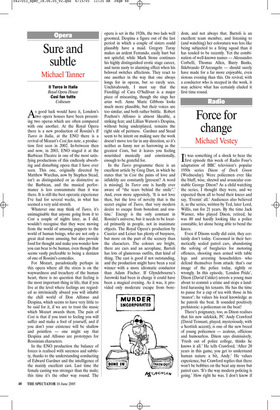Sure and subtle
Michael Tanner
Il Turco in Italia
Royal Opera House
Cosi fan tutte
Coliseum
As good luck would have it, London’s two opera houses have been presenting two operas which are often compared with one another. At the Royal Opera there is a new production of Rossini’s Il Turco in Italia, at the ENO there is a revival of Mozart’s Cosi fan tutte, a production first seen in 2002. In-between then and now, in 2003, ENO staged it at the Barbican Theatre in one of the most satisfying productions of this endlessly absorbing and disturbing opera that I have ever seen. This one, originally directed by Matthew Warchus, now by Stephen Stead, isn’t as distinguished or as distinctive as the Barbican, and the musical performance is less consummate than it was there. It is still the best operatic experience I’ve had for several weeks, in what has seemed a very arid stretch.
Whatever one may think of Turco, it’s unimaginable that anyone going from it to Cosi a couple of nights later, as I did, wouldn’t recognise that they were moving from the world of amusing puppets to the world of human beings, who are not only a great deal more amusing, but also provide food for thought and make you wonder how you can bear to be human, even though that seems vastly preferable to being a denizen of one of Rossini’s comedies.
For Mozart, paradoxically perhaps in this opera where all the stress is on the waywardness and treachery of the human heart, there is no question that feeling is the most important thing in life, that if you live at the level where feelings are regarded as intrinsically absurd you will inhabit the chill world of Don Alfonso and Despina, which seems to have very little to be said for it, if we are to trust the music which Mozart awards them. The pain of Cosi is that if you trust to feeling you will suffer and make a fool of yourself, and if you don’t your existence will be shallow and pointless — one might say that Despina and Alfonso are prototypes for Rossinian characters.
In the ENO production the balance of forces is realised with sureness and subtlety, thanks to the understanding conducting of Edward Gardner and the intelligence of the mainly excellent cast. Last time the female casting was stronger than the male; this time it’s the other way round. The opera is set in the 1920s, the two lads well groomed, Despina a figure out of the last period in which a couple of sisters could plausibly have a maid. Gregory Turay makes an ardent Ferrando, easily hurt but not spiteful; while Mark Stone continues his highly distinguished erotic stage career, and turns nasty to alarming effect when his beloved switches affections. They react to one another in the way that one always longs for in operas, but so rarely sees. Unchivalrously, I must say that the Fiordiligi of Cara O’Sullivan is a major piece of miscasting, though she sings her arias well. Anne Marie Gibbons looks much more plausible, but their voices are too similar, and both rather brittle. Robert Poulton’s Alfonso is almost likeable, a striking feat; and Lillian Watson’s Despina, without being underplayed, remains the right side of pertness. Gardner and Stead seem to be intent on making sure the work doesn’t move too far in any direction, so it’s neither as funny nor as harrowing as the greatest Cosis, but it leaves you feeling nourished musically and emotionally, enough to be grateful for.
In the Turco programme there is an excellent article by Greg Dart, in which he states that ‘in Cosi the pains of love and infidelity are constantly [present? A word is missing]. In Turco one is hardly ever aware of “the tears behind the smile”.’ And, even more appositely, ‘It is not love then, but the love of novelty that is the secret engine of Turco, that very modern desire to escape from boredom and routine.’ Energy is the only constant in Rossini’s universe, but it needs to be located primarily in people, not in inanimate objects. The Royal Opera’s production by Caurier and Leiser has plenty of busyness, but more on the part of the scenery than the characters. The colours are bright, there are cars and an aeroplane, Bartoli has lots of glamorous outfits, that kind of thing. The cast is good if not outstanding, and the production might have been a real winner with a more idiomatic conductor than Adam Fischer. If Glyndebourne’s Jurowski had been in charge it could have been a magical evening. As it was, it provided only moderate escape from bore dom, and not always that. Bartoli is an excellent team member, and listening to (and watching) her coloratura was less like being subjected to a firing squad than it has tended to be recently. Yet the combination of well-known names — Alessandro Corbelli, Thomas Allen, Barry Banks, Ildebrando D’Arcangelo — should surely have made for a far more enjoyable, even riotous evening than this. On revival, with a conductor who is steeped in the work, it may achieve what has certainly eluded it first time round.
















































 Previous page
Previous page